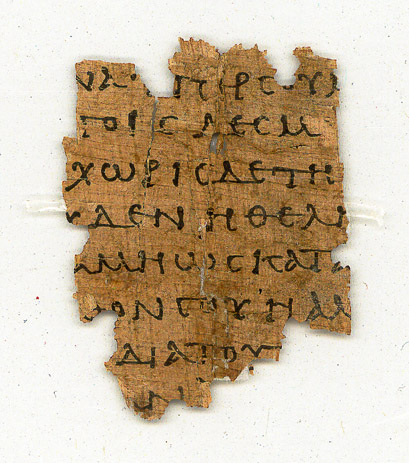
Epistle to Philemon
The Epistle to Philemon[a] is one of the books of the Christian New Testament. It is a prison letter, authored by Paul the Apostle (the opening verse also mentions Timothy), to Philemon, a leader in the Colossian church. It deals with the themes of forgiveness and reconciliation. Paul does not identify himself as an apostle with authority, but as "a prisoner of Jesus Christ", calling Timothy "our brother", and addressing Philemon as "fellow labourer" and "brother" (Philemon 1:1; 1:7; 1:20). Onesimus, a slave that had departed from his master Philemon, was returning with this epistle wherein Paul asked Philemon to receive him as a "brother beloved" (Philemon 1:9–17).
Philemon was a wealthy Christian, possibly a bishop[3] of the church that met in his home (Philemon 1:1–2) in Colossae. This letter is now generally regarded as one of the undisputed works of Paul. It is the shortest of Paul's extant letters, consisting of only 335 words in the Greek text.[4]
Content[edit]
Greeting and introduction (1–3)[edit]
The opening salutation follows a typical pattern found in other Pauline letters. Paul first introduces himself, with a self-designation as a "prisoner of Jesus Christ," which in this case refers to a physical imprisonment. He also mentions his associate Timothy, as a valued colleague who was presumably known to the recipient. As well as addressing the letter to Philemon, Paul sends greetings to Apphia, Archippus and the church that meets in Philemon's house. Apphia is often presumed to be Philemon's wife and Archippus, a "fellow labourer", is sometimes suggested to be their son. Paul concludes his salutation with a prayerful wish for grace and peace.[22]
Thanksgiving and intercession (4–7)[edit]
Before addressing the main topic of the letter, Paul continues with a paragraph of thanksgiving and intercession. This serves to prepare the ground for Paul's central request. He gives thanks to God for Philemon's love and faith and prays for his faith to be effective. He concludes this paragraph by describing the joy and comfort he has received from knowing how Philemon has shown love towards the Christians in Colossae.[23]
Paul's plea for Onesimus (8–20)[edit]
As a background to his specific plea for Onesimus, Paul clarifies his intentions and circumstances. Although he has the boldness to command Philemon to do what would be right in the circumstances, he prefers to base his appeal on his knowledge of Philemon's love and generosity. He also describes the affection he has for Onesimus and the transformation that has taken place with Onesimus's conversion to the Christian faith. Where Onesimus was "useless", now he is "useful" – a wordplay, as Onesimus means "useful". Paul indicates that he would have been glad to keep Onesimus with him, but recognised that it was right to send him back. Paul's specific request is for Philemon to welcome Onesimus as he would welcome Paul, namely as a Christian brother. He offers to pay for any debt created by Onesimus' departure and expresses his desire that Philemon might refresh his heart in Christ.[24]
Conclusion and greetings (21–25)[edit]
In the final section of the letter, Paul describes his confidence that Philemon would do even more than he had requested, perhaps indicating his desire for Onesimus to return to work alongside him. He also mentions his wish to visit and asks Philemon to prepare a guest room. Paul sends greetings from five of his co-workers and concludes the letter with a benediction.[25]
Themes[edit]
Paul uses slavery vs. freedom language more often in his writings as a metaphor.[26]
This letter may have provided some comfort to some slaves of the time.[27]
Though its practice appears centrally, Paul does not share value judgements about the institution of slavery. Its influence could create pressures, as an “abolitionist would have been at the same time an insurrectionist, and the political effects of such a movement would have been unthinkable."[28] Paul saw human institutions like slavery among many that in his apocalyptic view would soon go.[28]
When it comes to Onesimus and his circumstance as a slave, Paul felt that Onesimus should return to Philemon but not as a slave; rather, under a bond of familial love. Paul also was not suggesting that Onesimus be punished, in spite of the fact that Roman law allowed the owner of a runaway slave nearly unlimited privileges of punishment, even execution.[29] This is a concern of Paul and a reason he is writing to Philemon, asking that Philemon accept Onesimus back in a bond of friendship, forgiveness, and reconciliation. Paul is undermining this example of a human institution which dehumanizes people.[29] Onesimus, like Philemon, belongs to Christ, and so "Christ, and not Philemon, has a claim on Onesimus' honor and obedience."[30]
Verses 13–14 suggest that Paul wants Philemon to send Onesimus back to Paul (possibly freeing him for the purpose). Marshall, Travis and Paul write, "Paul hoped that it might be possible for [Onesimus] to spend some time with him as a missionary colleague... If that is not a request for Onesimus to join Paul’s circle, I do not know what more would need to be said".[31]